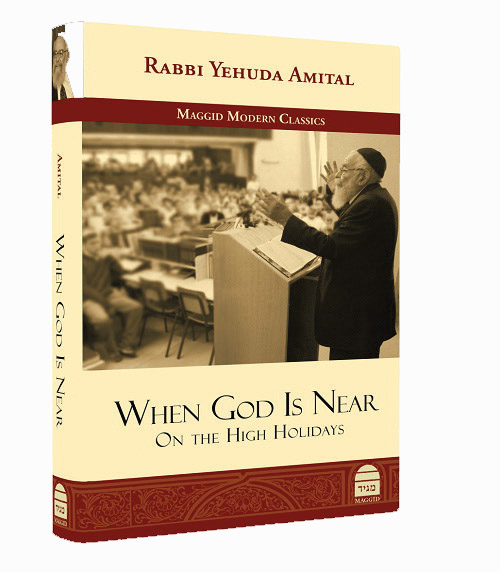
Reviewing “When God Is Near: On the High Holidays” by Rabbi Yehuda Amital, edited by Yoel Amital, translated by Kaeren Fish. Maggid Books, Yeshivat Har Etzion. Hardcover, 306 pages, 2015. ISBN-10: 1592644376.
“Some people’s Torah is to be found in their books, for others, in their lives,” my late, revered teacher, Rav Yehuda Amital once shared with me.
Here as always, his brief, aphoristic, seemingly simple words carried a world of meaning. His Torah was centered on embracing life and taking responsibility before God—and for one another—in our everyday lives.
At the same time, in some ways, he was talking about himself. He didn’t write much. And for a long time, his ideas and teachings were limited to those with firsthand exposure to his rare mix of piety, erudition, humanity and daringness. The founder of the Hesder yeshivot, founding Rosh Yeshiva of Yeshivat Har Etzion and a leading figure in Religious Zionism and Israeli public life indeed had a tremendous impact on hundreds, if not thousands, of students who had the opportunity to learn from him firsthand.
One can then understand my happiness about the books that have come out in the past few years recounting Rav Amital’s legacy, including Elyashiv Reichner’s “The Audacity of Faith”; several collections of Rav Amital’s teachings entitled “Commitment and Complexity”; “Jewish Values in a Changing World, Resisei Tal”—two volumes of his halachic writings; “A World Built Destroyed and Rebuilt,” an important volume on his understanding of the Holocaust, which he experienced in his youth, and other studies in Hebrew and in English (see “Torah and Humanity in a Time of Rebirth: Rav Yehuda Amital as Educator and Thinker”).
Joining these works is this wonderful collection of sichot (talks) he gave in the yeshiva over the month of Elul and the High Holidays, edited by his son, Yoel, now deftly translated by Kaeren Fish, entitled “When God Is Near.”
The English title, “When God Is Near,” will ring very true for anyone who ever experienced Yamim Noraim with Rav Amital. Both the prayers he led and the talks he gave burned with plain-spoken honesty and faith. Along with the riveting humility and intensity of his co-yeshiva head, Rabbi Aharon Lichtenstein, those days in yeshiva gave students indelible models of honest piety. And in this English title, too, his distinctive educational philosophy shines through—God is near because, as he never tired of saying, God loves humanity and bids us serve Him with and through our very humanity, and because religious ideals and their possible realization are as close to hand as they are sublime.
The original Hebrew volume was entitled “Et Ratzon,” or “A Time of Favor,” as it’s referred to in the liturgy. Perhaps “A Time of Grace” would be better, the period given to praying for God’s grace, which is God’s reward to us for human introspection, regret and change. Yet this phrase takes on special meaning when it comes to Rav Amital, who as an educator, saw his responsibility to cultivate his students’ will, not only in their commitment to Torah and mitzvot and to engagement with society, but in their own ability to know their own minds and choose out of their own convictions—whether or not their convictions were the same as his.
Woven throughout is Rav Amital’s conviction that, precisely, the halacha forces us to encounter our own authenticity. To take just one example from this rich volume: In the liturgy, the ram sacrificed by Abraham in place of Isaac is associated with the ram’s horn of the shofar. God’s answer to Abraham’s call in that moment is, hineni, “Here I am.” This, Rav Amital says, echoes the very first God-human encounter.
“The question posed to Adam (by God in the Garden of Eden)—‘Where are you?’—is addressed to every person whenever and wherever he may live.” This question, he says, is the essence of the Day of Judgment of Rosh Hashanah. But “more awful and frightening (is that) a person may forget his own name and his own self, even on the Day of Judgment…when self-image is based only on actions and experiences, not his inner thoughts and feelings.” Thus, “every person must find his unique place within the Torah,” without which, “he remains in a kind of exile.” That is why, Rav Amital says, the Talmud rules (Rosh Hashanah 27b) that if one shofar rests within another, the obligation is fulfilled only if the sound of the inner shofar can be heard. Because “God longs to hear our inner voice.”
Yet this inner voice, this quest for authenticity, is not solipsistic self-gratification, but divine service itself. “May we find our special letter in the Torah and discover our true voice. Only then, when we make that voice heard, in its pure form, will we fulfill our obligation.”
It is, in his vision, through the life of prosaic obligation that our innermost selves are achieved. Of the daily routines of going to synagogue, keeping kosher, saying our prayers, he says, “here too we must rise to the gate, work harder at the interiority of things. As we focus on the interiority of mitzvot, the challenge is undoubtedly greater.”
In these pages, the reader will find a teacher who taught by example how to navigate the world, its joys and heartbreaks, through a religious life lived in truth, and a powerful religious message, conveyed with deceptive simplicity, of challenge and consolation.
By Yehudah Mirsky
Yehudah Mirsky teaches at Brandeis University and is the author of the award-winning volume “Rav Kook: Mystic in a Time of Revolution.” He tweets @YehudahMirsky. “When God Is Near” is published by Maggid Books, a division of Koren Publishers Jerusalem.










